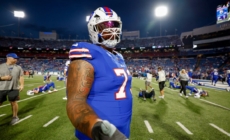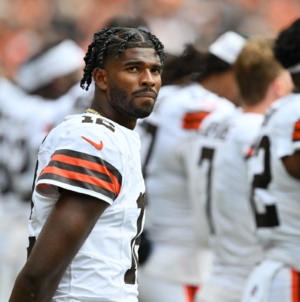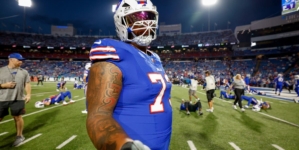-
NFL Week 8 Best Locker Room Speeches: Aaron Glenn Pays Tribute to Nick Mangold - 23 mins ago
-
Browns Fans Convinced Shedeur Sanders’ Latest Post Was a Goodbye Message - 27 mins ago
-
5 crew members rescued after Navy helicopter, fighter jet go down in South China Sea in separate incidents - 29 mins ago
-
LPGA: Team Australia Outshines U.S. for First International Crown Win - about 1 hour ago
-
LSU Reportedly Fires Brian Kelly After Blowout Loss to Texas A&M - about 1 hour ago
-
Lakers Announce Luka Doncic Replacement Following Injury News - 2 hours ago
-
Sydney Sweeney debuts new bob haircut amid Scooter Braun romance rumors - 2 hours ago
-
4 Takeaways From the Broncos’ Win Over the Cowboys - 2 hours ago
-
Bills-Panthers Involved in Heated Postgame Brawl - 2 hours ago
-
First arrests made after Louvre jewel heist - 3 hours ago
‘Crush Recession’: Gen Zers and Millennials Suffering Love Life Phenomena
Most people can recall a time in their younger years when they felt butterflies in their stomach at the mere sight of their crush, or felt their eyes excitedly dart around a room while trying to spot that special someone.
There is a specific kind of yearning involved in having a crush, one that feels intense, yet is for the most part harmless fun; still, as people grow older the frequency of such infatuations often decreases. For those who are still single and still searching, there appears to be a crush recession going on, and Newsweek wants to understand why.
TikTok creator @monsharx put it plainly: “I can’t remember the last time I had a crush.”
Her video, viewed thousands of times, taps into a growing online consensus that something fundamental has shifted. We are, many imply, in something of a recession when it comes to fancying others.
Some blame digital dating culture and the struggle many are now facing to find stable relationships. Others point to emotional maturity or social fatigue. But all agree: something has changed.
Newsweek spoke with two psychological experts who described a noticeable decline in how often adults experience romantic infatuation—whether fleeting, intense or somewhere in-between.
‘Crush Recession’
For @monsharx, a 26-year-old woman living in London, England, the crush recession is not just theoretical, but personal too.
“I cannot remember the last time I felt an attraction or a spark,” she told Newsweek. “Being a straight 20-something woman in 2025 is becoming some sort of humiliation ritual.”
After spending a year intentionally single—eschewing dating apps and romantic entanglements to focus on herself—she said she was ready to date again.
“But where?” She added. “The deep dark trenches!”
The Gen Z creator said that with age came a firmer understanding of what she needs in a partner—and less tolerance for anything less.
“I cannot keep writing off these negative experiences with the fact that I am getting older, but unfortunately, they were right. With age and a fully developed frontal lobe, my expectations for how I should be treated have gone up,” she said.
Far from lamenting the loss of youthful butterflies, she said she now seeks qualities like chivalry, kindness, respect and emotional intelligence—but also admits to missing the fun of having a crush. Plenty of her viewers agreed.
Other creators have echoed the same shift. In a viral TikTok clip from June, @miaparziale spoke about the loss of those early thrills.
“I used to have so much more fun and had crushes when I was younger,” she told viewers. “I want to have a crush, I want to have butterflies.”
One viewer commented: “I don’t even have celebrity crushes anymore either.”
Do Crushes Really Fade With Age?
“What people call a ‘crush recession’ may actually be an adaptive recalibration of the adult mind,” Dr. Kirsten Viola Harrison, a psychologist, told Newsweek.
“As we mature, our emotional energy shifts from novelty and fantasy towards stability and self-awareness.”
Harrison referenced Freud’s theory of sublimation—the redirection of instinctual drives into more meaningful, productive forms.
“The ‘crush recession’ isn’t the death of desire, it is desire growing wiser,” she said. “In youth, we project the magical bliss of possibilities and belief outward…Turning that spark inward fuel’s purpose, creativity and self-understanding.”
For Harrison, the fading of fleeting infatuations signals not emotional shutdown, but liberation.
“Freedom to choose wisdom and stability over instinct and unbridled intensity,” she said. “If you thought teen crushes were wild and unfettered, you could not imagine the ecstasy of falling in love with your own well-lived, deeply loved life.”
Licensed psychotherapist Lucas Saiter agreed that a decline in crushes is common in adulthood.
“When we’re younger, having a crush can feel thrilling—it’s a way of discovering who we’re attracted to and how we want to show up in relationships,” he told Newsweek. “But over time, our emotional energy shifts.”
He said the thrill of novelty gives way to deeper priorities.
“Between work, relationships, and just knowing ourselves better, fewer people truly spark that kind of chemistry,” he said.
“That’s not a sign of something missing; it often reflects how our priorities evolve from chasing the spark to valuing emotional safety and depth.”
However, Saiter added, some people might experience this shift as emotional self-protection, especially after facing trauma or feelings of burnout.
“You might lean into hyper-independence or numbness, not because you’ve stopped caring, but because vulnerability feels unsafe,” Saiter said. “Therapy can help make sense of those protective patterns and slowly reconnect you with your own sense of desire.”
Still, not everyone sees the crush recession as a universal experience. Dr. Karen Stewart, a sex and relationship therapist, told Newsweek that crushing is still common, even in older age—it just changes form.
“A teenage crush will undoubtably be more intense because of hormone fluctuations, lack of experience in relationships and overall heightened excitability at that age,” she said.
But she added that in her clinical experience, people of all ages still experience giddy romantic excitement.
“I have witnessed many people of all ages, even up to 80-years-old, look like ‘giggly schoolgirls and schoolboys’ regarding a new romantic person in their lives,” she said.
Perhaps the Gen Z and millennial voices online that are expressing how much they miss the thrill of having a crush have something to look forward to.
Newsweek reached out to @miaparziale for more information via TikTok and email.
Have you had a relationship dilemma? Let us know via life@newsweek.com. We can ask experts for advice, and your story could be featured on Newsweek.
Source link





























